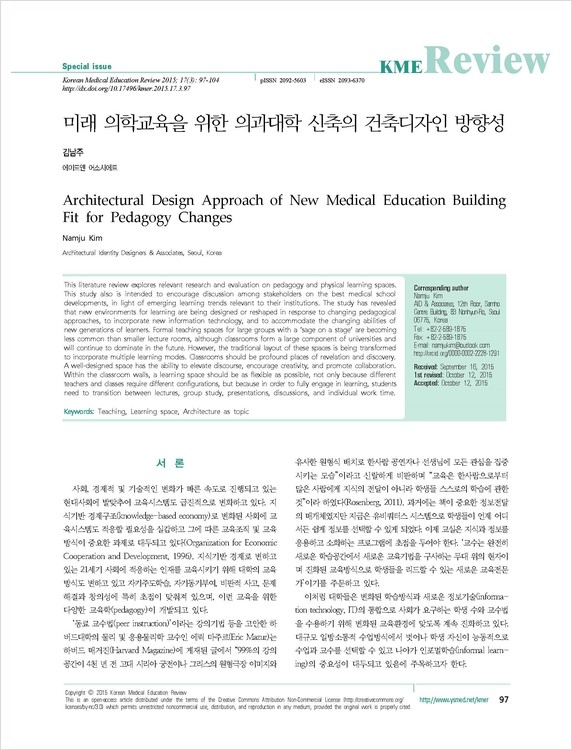미래 의학교육을 위한 의과대학 신축의 건축디자인 방향성
미래 의학교육을 위한 의과대학 신축의 건축디자인 방향성
Architectural Design Approach of New Medical Education Building Fit for Pedagogy Changes
저자 김남주
소속 김남주
학술지정보 의학교육논단 KCI
발행정보 연세대학교 2015년
발행정보 연세대학교 2015년
자료제공처 국회도서관 KISTI 의학연구정보센터 한국연구재단
주제분야 의약학 > 의약학일반
주제분야 의약학 > 의약학일반
<초록>
This literature review explores relevant research and evaluation on pedagogy and physical learning spaces. This study also is intended to encourage discussion among stakeholders on the best medical school developments, in light of emerging learning trends relevant to their institutions. The study has revealed that new environments for learning are being designed or reshaped in response to changing pedagogical approaches, to incorporate new information technology, and to accommodate the changing abilities of new generations of learners. Formal teaching spaces for large groups with a ‘sage on a stage’ are becoming less common than smaller lecture rooms, although classrooms form a large component of universities and will continue to dominate in the future. However, the traditional layout of these spaces is being transformed to incorporate multiple learning modes. Classrooms should be profound places of revelation and discovery. A well-designed space has the ability to elevate discourse, encourage creativity, and promote collaboration. Within the classroom walls, a learning space should be as flexible as possible, not only because different teachers and classes require different configurations, but because in order to fully engage in learning, students need to transition between lectures, group study, presentations, discussions, and individual work time.
This literature review explores relevant research and evaluation on pedagogy and physical learning spaces. This study also is intended to encourage discussion among stakeholders on the best medical school developments, in light of emerging learning trends relevant to their institutions. The study has revealed that new environments for learning are being designed or reshaped in response to changing pedagogical approaches, to incorporate new information technology, and to accommodate the changing abilities of new generations of learners. Formal teaching spaces for large groups with a 'sage on a stage' are becoming less common than smaller lecture rooms, although classrooms form a large component of universities and will continue to dominate in the future. However, the traditional layout of these spaces is being transformed to incorporate multiple learning modes. Classrooms should be profound places of revelation and discovery. A well-designed space has the ability to elevate discourse, encourage creativity, and promote collaboration. Within the classroom walls, a learning space should be as flexible as possible, not only because different teachers and classes require different configurations, but because in order to fully engage in learning, students need to transition between lectures, group study, presentations, discussions, and individual work time.
저희 (주)한국녹색인증원은 '지속가능한 저탄소 녹색건축인증 기술연구소'의 전문기업으로 설립되어, 빠른 제도 변화와 변모하는 건설환경에 이바지하고자 합니다. (주))한국녹색인증원은 건축, 도시, 생태분야가 녹색건축물에 접목될 수 있도록 적절한 요소분석을 통해 에너지 절감형 건축, 자생적 생태환경, 온열환경, 빛환경의 면밀한 조사와 연구로 고객의 삶의 질 향상 및 더 나아가 인류의 존속성에 그 목적을 두고 있습니다. 한국녹색인증원은 친환경컨설팅 전문업체로 주택성능등급, 그린홈, 에너지소비총량제, 에너지성능지표검토서, 건물에너지효율등급, 장수명주택










(%EC%A0%9C19819%ED%98%B8)(20250501)001.jpg)
(%EC%A0%9C34657%ED%98%B8)(20240710)001.jpg)
댓글
댓글 쓰기